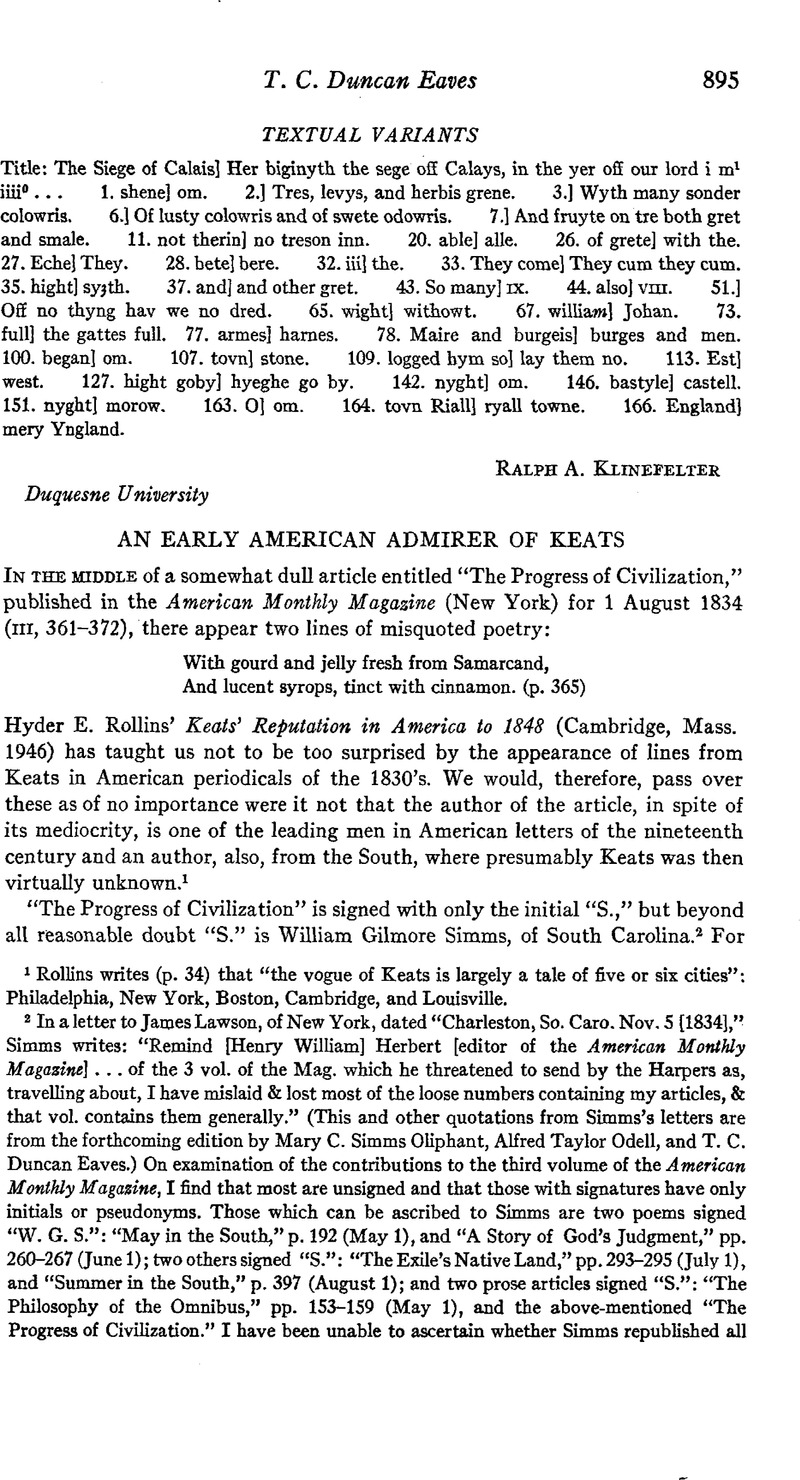No CrossRef data available.
Article contents
An Early American Admirer of Keats
Published online by Cambridge University Press: 02 December 2020
Abstract

- Type
- Notes, Documents, and Critical Comment
- Information
- Copyright
- Copyright © Modern Language Association of America, 1952
References
1 Rollins writes (p. 34) that “the vogue of Keats is largely a tale of five or six cities”: Philadelphia, New York, Boston, Cambridge, and Louisville.
2 In a letter to James Lawson, of New York, dated “Charleston, So. Caro. Nov. 5 [1834],” Simms writes: “Remind [Henry William] Herbert [editor of the American Monthly Magazine] ... of the 3 vol. of the Mag. which he threatened to send by the Harpers as, travelling about, I have mislaid & lost most of the loose numbers containing my articles, & that vol. contains them generally.” (This and other quotations from Simms's letters are from the forthcoming edition by Mary C. Simms Oliphant, Alfred Taylor Odell, and T. C. Duncan Eaves.) On examination of the contributions to the third volume of the American Monthly Magazine, I find that most are unsigned and that those with signatures have only initials or pseudonyms. Those which can be ascribed to Simms are two poems signed “W. G. S.”: “May in the South,” p. 192 (May 1), and “A Story of God's Judgment,” pp. 260-267 (June 1); two others signed “S.”: “The Exile's Native Land,” pp. 293-295 (July 1), and “Summer in the South,” p. 397 (August 1); and two prose articles signed “S.”: “The Philosophy of the Omnibus,” pp. 153-159 (May 1), and the above-mentioned “The Progress of Civilization.” I have been unable to ascertain whether Simms republished all of these under his name either in other periodicals (as was frequently his practice) or in volumes of his collected works, but both “A Story of God's Judgment” and “Summer in the South” (each somewhat revised) later appeared in the two-volume edition of his Poems published in New York by Redfield in 1853 (i, 261-272; ii, 218-220). Furthermore, “The Philosophy of the Omnibus” Simms later mentions as his in a letter to Evert A. Duyckinck, dated “Charleston, Aug. 8. [1845].” It is reasonable to assume that the other contributions signed either “W. G. S.” or “S.” are also his.
3 This edition has been inaccessible to me. The review gives the publisher as Carey, Lea & Carey.
4 At this time the Southern Literary Gazette was edited jointly by Simms and James W. Simmons. The review is unsigned and hence might be by either editor, but its tone is, I think, unmistakably Simms's. Simms and Simmons edited the Southern Literary Gazette jointly from the issue for Sept. 1828 through that for March 1829. Simms was sole editor of the “New Series” (15 May-15 Oct. 1829). Simms published one issue of a continuation of the periodical under the title of the Pleiades and Southern Literary Gazette, of which no copy is known to be extant.
5 Simms was sole editor of the Southern Literary Gazette at this time. The essay is remarkably similar to the opening of “The Student. Love of Study,” an unsigned article in the Southern Quart. Rev., viii, N. S. (July 1853), 188-214. Simms was in the habit of using his shorter pieces over and over again, and the publication of two such similar pieces at such disparate times in periodicals edited by Simms makes the probability of his authorship of both almost a certainty.
6 In recounting the devastation of Woodlands during the Confederate War, Simms writes in a letter to Lawson of 13 June 1865: “Among my losses is my library, 10,700 vols! My books! My books! My heart is ready to break when I think of them.”
7 For Willis' complaints, see Rollins, pp. 22-23.
8 For an account of these editions, see ibid., pp. 26-30. Simms was in Philadelphia during the summer of 1832 and could easily have obtained a copy at that time. On 4 July and again on 17 July he wrote to Lawson from that city.
9 Letter to Benjamin F. Perry of 13 Oct. 1843.


